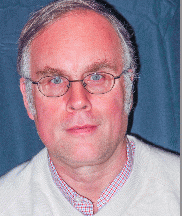John by photo courtesy of the author
My guest today is author and autism advocate, John Elder Robison. Welcome to OpEdNews, John. Before you wrote your latest book, you had already written two books: Look Me In The Eye: My Life with Asperger's [2008] and Be Different: My Adventures with Asperger's and My Advice for Fellow Aspergians, Misfits, Families, and Teachers [2012] . Raising Cubby, A Father and Son's Adventures with Asperger's, Trains, Tractors, and High Explosives [2013] moves beyond your personal saga to encompass your son and fatherhood. What compelled you to write this intensely personal story?
JER: I had written about growing up in Look Me in the Eye, and people asked how I did it. They wanted to know exactly how I got a job, found a girlfriend, and did the other things I wrote about. So I wrote Be Different, which is essentially a how-to guide to my success. My hope was that any young person could translate my stories to his or her own life, and get benefit.
But that still left the parents of young kids. And there are lots of them out there. I wrote Raising Cubby to show another side of parenting kids who are different. I wanted parents to see it's not all struggle, and kids all want to have fun!
I also wanted to share the story of the prosecutor's attack on my son, because people with autism and other differences are victimized in that way all too often.

book cover by courtesy of the author
JB: Let's give a little background for those of our readers who are not familiar with you or your books. While you sensed that you were different from your classmates growing up, you didn't actually get diagnosed as having Asperger's until you were 40. How did that work out? Was it helpful to know? How, if at all, did it change things? Could you have used that piece of information a lot sooner?
JER: I grew up in the sixties, before things like Asperger's were recognized. People just said I was lazy, or a bad kid. Sure, I might have done better had I received compassion and support instead of threat and discipline but who knows?
I certainly knew I was different from the other kids by the way I was rejected and kept on the outside. Yet I was determined to make it, and I did. Learning about Asperger's when I was 40 did change my life by explaining my earlier social failures.
For a kid knowing today, early detection surely can make a difference. But for me, growing up in a less aware time, who can know...?

John and Cubby aka Jack by courtesy of the author
JB: Do you think that your own Asperger's made you miss the telltale signs that your son had it, too? You mention the many similarities between the two of you. What did you notice?
JER: First of all, you have to remember that I didn't learn about my own Asperger's till my son was in second grade. And it took a while after that for me to begin looking for Asperger traits in him.
That said, I did notice he had the same sorts of social problems I remembered from my own childhood. When I saw that, I didn't know "why" but I did give him my best advice and I was happy to see him succeed where I had failed.
In Look Me in the Eye, I wrote about discovering the need to make relevant responses. For example, when a kid came up to me and said, "Look at my new truck," I should not say, "I like helicopters." I didn't learn that till age ten - at least - where typcial kids figure things like that out early. When I saw my son make mistakes like that at age 4 or 5, I advised him based on my experience, and it worked. He had more friends than I ever did. I describe that process in detail in Raising Cubby.
JB: That you did. While we now have diagnoses for conditions that once had no name, that doesn't mean that our institutions deal with them very well. Take your public school system's methods of dealing with Cubby, for instance. Can you talk about that a bit?
(Note: You can view every article as one long page if you sign up as an Advocate Member, or higher).






